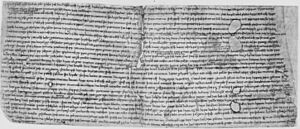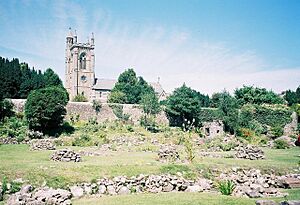Ælfgifu of Shaftesbury facts for kids
Quick facts for kids Ælfgifu of Shaftesbury |
|
|---|---|
| Queen consort of the English | |
| Tenure | c. 939–944 |
| Died | c. 944 |
| Burial | Shaftesbury Abbey |
| Spouse | Edmund I, King of the English |
| Issue | King Eadwig King Edgar |
| Mother | Wynflaed |
| Saint Ælfgifu of Shaftesbury |
|
|---|---|
| Venerated in | Catholic Church |
| Feast | 18 May |
Ælfgifu of Shaftesbury was an important queen in early England. She was the first wife of King Edmund I, who ruled from 939 to 946. Ælfgifu was Queen of the English from about 939 until she died in 944.
She and King Edmund had two sons who later became kings: Eadwig (who ruled from 955 to 959) and Edgar (who ruled from 959 to 975). Ælfgifu had a special connection with Shaftesbury Abbey, a royal nunnery in Dorset. This abbey was founded by King Alfred. Ælfgifu was buried there and soon became known as a saint. Her special day, or feast day, is celebrated on May 18th.
Who Was Ælfgifu's Family?

Ælfgifu's mother was likely a woman named Wynflaed, who was connected to Shaftesbury Abbey. We know this from an old document signed by King Edgar, Ælfgifu's son. This document says that his grandmother, Wynflæd, gave land to Shaftesbury Abbey.
Some historians think this Wynflæd might be the same woman who wrote a will (a document saying what happens to her property after she dies). This will was written sometime in the mid-900s, after Ælfgifu had passed away. This Wynflæd owned many estates across southern England. She also had strong ties to other royal nunneries, like Wilton and Shaftesbury.
If this is true, then Ælfgifu might have had a sister named Æthelflæd and a brother named Eadmær. However, not all historians agree on this. They point out that Wynflæd's will doesn't mention any royal family members. This makes it hard to be sure if she was indeed Ælfgifu's mother.
Ælfgifu's Life as Queen
We don't know the exact date Ælfgifu married King Edmund. Their oldest son, Eadwig, was born around 940. This means Ælfgifu must have married Edmund before that time.
Even though she was the mother of two future kings, there isn't much proof that she was officially crowned as queen during her lifetime. However, a writer from later in the 900s, Æthelweard, did call her "queen."
Ælfgifu is famous for her strong connection to Shaftesbury Abbey. An old document from King Æthelred (who ruled later) suggests she was a patron of the abbey. It mentions that King Edmund traded a large estate for another piece of land called Butticanlea. Ælfgifu received this land from her husband and wanted to give it to the nunnery. However, she died before she could do so. Her son, King Eadwig, wanted the land returned to the royal family first.
Ælfgifu died before her husband, probably in 944. She might have died while giving birth to her son Edgar. An old writer named William of Malmesbury said she was sick for several years before she died. Her body was buried at Shaftesbury Abbey, and her tomb became a special place.
Becoming a Saint
People began to see Ælfgifu as a saint very soon after she was buried at Shaftesbury. Stories say that many miracles happened at her tomb. These miracles attracted a lot of attention from people nearby.
Lantfred of Winchester, who wrote in the 970s, is one of the earliest people to mention her sainthood. He wrote about a young man who was blind and traveled to Shaftesbury hoping to be cured. He went there because of the stories about "the venerable St. Ælfgifu," whose tomb was known for healing sick people.
Even after another saint, Edward the Martyr, was buried at Shaftesbury, Ælfgifu's fame as a saint continued. Her name appeared in lists of saints and in church calendars from that time.
In an old version of the Anglo-Saxon Chronicle, Ælfgifu is called "Saint Ælfgifu." Her sainthood may have helped make her sons' royal family seem even more important. Lantfred even said that her healing powers came from both her own good deeds and those of her son Edgar.
William of Malmesbury wrote that Ælfgifu would secretly help people who were in trouble. She also gave expensive clothes to the poor. He also said she had special powers to predict the future and to heal people.
Ælfgifu's fame at Shaftesbury Abbey grew so much that she became more well-known than the abbey's first abbess, who was King Alfred's daughter. Some old writings even mistakenly said that Ælfgifu founded the abbey herself.
See also
- Ælfgifu of Exeter
 | Jackie Robinson |
 | Jack Johnson |
 | Althea Gibson |
 | Arthur Ashe |
 | Muhammad Ali |


